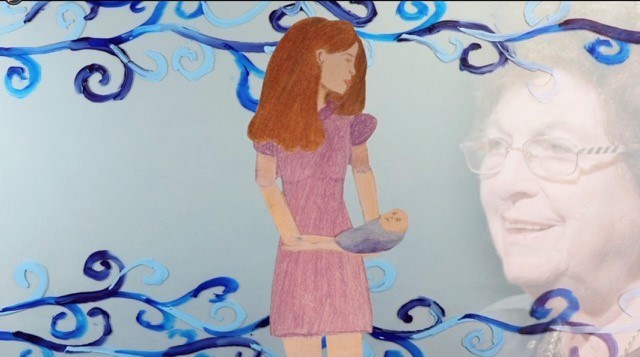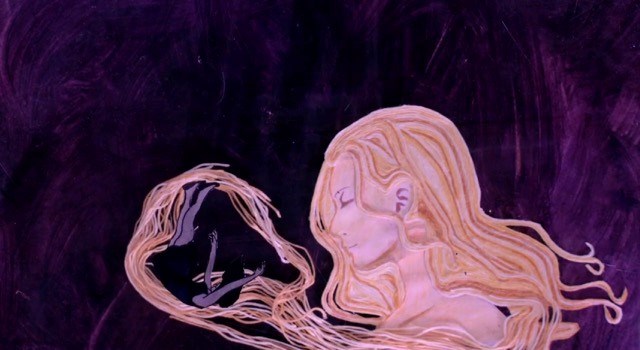 Image taken from 'A Prayer for My Mother: The Eva Brettler Story'The Righteous Conversations Project
Image taken from 'A Prayer for My Mother: The Eva Brettler Story'The Righteous Conversations Project
About the Film
A Prayer for My Mother: The Eva Brettler Story is a short, animated film, which has won the Women Transforming Media Award and the High School Animation Award at the 2023 MY HERO International Film Festival. The film was directed by several young filmmakers (Ruben Barrett, Raisa Effress, Sophia Evans, Lauren Fuchs, Katie Hadsock-Longarzo, Ian Kim, Eve Levy, Timothy Lim, Asher Meron, Marion Ochoa, Isabella Rahi, Hank Schoen, and Olivia Uzielli) and produced by Cheri Gaulke and Samara Hutman as part of the Righteous Conversations Project.
The film details the extraordinary life of Holocaust survivor Eva Brettler. Brettler was born on November 29, 1936, in Kolozsvar, Transylvania to her father, a printer, and her mother, a hat maker. When Eva was just 4 years old, her father lost job because he was Jewish, despite being extremely good at his job and receiving honors.
At 7 years old, Eva and her family went to visit her grandmother. During the visit, a policeman came to the house to collect her family and take them to a labor camp; Eva’s name was not on the list, so her grandmother told her to hide in a cornfield and go a neighbour when it was safe. When her father went to pick her up, they had to walk separately and pretend that they didn’t know each other as he was wearing the Star of David and he feared that Eva would be taken to a labor camp if the police realized she was his daughter. He put her on the train and asked a young woman to look after Eva during her journey. Despite the risk of being arrested for helping, the woman agreed to accompany Eva and watch over her on the train. Eva’s father, however, was arrested and taken to a labor camp.
Her mother got papers for a Swedish safe house and had to hide Eva in a basket on top of the furniture whilst she hid in the elevator shaft until it was safe to rescue Eva. As they left the safe house, a policeman was stood outside and saw them trying to leave. Instead of arresting them, he let them go. Her mother told Eva to use a new name and tried to get her into school. However, two policemen knew their real name and arrested them, sending them on the forced labor march to Germany.
By 1945, Eva was forced to Ravensbruck, a labor camp in Northern Germany. Upon arrival, they stripped her of her clothes, shaved her hair, sprayed her with disinfectant and put her in strange clothes. An older woman, whom she called “Tante,” looked after Eva in the camp, reminding her to, “Never, never give up hope. And please keep on praying.”
One day, a British soldier picked her up and gave her a chocolate bar. The British had liberated the Jewish people, and they were finally free to leave the camps. Eva then moved to live in an orphanage in Sweden, believing that both her mother and father had been killed. There, she met a kind woman called Luba who became a mother figure to her.
 Image taken from 'A Prayer for My Mother: The Eva Brettler Story'The Righteous Conversations Project
Image taken from 'A Prayer for My Mother: The Eva Brettler Story'The Righteous Conversations Project
Decades later, Eva is living in the U.S., married to fellow survivor Marten Brettler and with four children and nine grandchildren. She, of course, still misses her mother but is proud to be sharing her story for her eight-year-old self.
A student who worked on the film, Eve Levy, spoke to MY HERO about the making of the film. Levy is currently at USC, majoring in Animation and Digital Arts. She has been making films with The Righteous Conversation Project for four years. On the importance of the project, Levy wrote:
“The importance of connecting with Holocaust survivors did not escape me. Gen X will be the last generation with the chance to talk with survivors directly. Although future generations will, hopefully, study the Holocaust in history class, learning about the facts and statistics is incomparable to sitting down with survivors and hearing their experiences first hand. In the wake of growing Holocaust denial, these connections become all the more important.”
Telling Eva Brettler’s story was particularly important to Levy; they formed a connection when discussing their cultural experiences, Brettler as a Hungarian Jew and Levy as an Iranian Jew. As they talked, it transpired that they had several mutual friends, had been in the same room before, and that Brettler had helped thousands of Jewish children escape Iran during the revolution in 1979 alongside Levy’s grandfather! Levy wrote to MY HERO,
“As soon as this connection was made Eva treated me like a member of her own family; She held my hands or my side for the rest of the day, whispering quips in my ear that I had to restrain myself from reaction to while trying to draw her portrait. Two years later, she even sat shiva with my family in a difficult time.”
On making the film, Levy explains that she feels Brettler’s story is aided by the elements of the students’ filmmaking process coming through; she notes that, “[their] art brings Eva’s youth, as well as her emotional lens, to the forefront of the film.” Levy adds, “The film expresses the connection between us students and Eva, our inter-student relationships, and our artistic individuality without detracting from Eva’s testimony.”
You can watch A Prayer for My Mother: The Eva Brettler Story, here.
Read Eve Levy’s essay about the making of the film here.
About the Righteous Conversations Project
The Righteous Conversations Project was launched in 2011 when a group of parents and students, the head of Harvard-Westlake's Upper School Visual Arts Department, Cheri Gaulke and head of History, Dror Yaron started reaching out to Holocaust survivors to hear their stories. The parents and students had worked closely with Remember Us, a foundation dedicated to remembering the children lost in the Holocaust, but wanted to take their commitment to Holocaust memory one step further by hearing from survivors directly. The director of Remember Us, Samara Hutman, and Cheri Gaulke decided to collaborate, and The Righteous Conversations Project was formed.
The Righteous Conversations Project brings Holocaust survivors and students together; survivors share their stories of resilience and resistance, whilst students document the stories in the form of short films or Public Service Announcements. On their website, the project is outlined as the following:
“The Righteous Conversations Project facilitates dialogue, social action and collaborative creative work connecting students with Holocaust Survivors. In workshops and engagements developed in collaboration with schools and community organizations RC provides students with opportunities to carry on the work of Holocaust Remembrance and to speak up about injustice in the world around them through film, new media, music and photography.”[1]
The films created as part of the project have won awards in film festivals across the globe and have been gifted to several non-profit organizations dedicated to social justice.
To read more about The Righteous Conversations Project, click here, or visit their website at http://righteousconversations.org/.
About the MY HERO International Film Festival
The MY HERO International Film Festival brings together professional and youth filmmakers who honor local and global heroes working for positive change in the world. Thanks to generous sponsors, prizes are awarded to elementary, middle school, high school, college and professionals in a variety of categories including documentary, narrative, music video, animation, experimental, and more.
To find out more about the Film Festival go to: /Films/festival
About the Women Transforming Media Category
At the 12th annual MY HERO International Film Festival, Eva Haller received the inaugural Women Transforming Media Award. Eva had the idea of establishing an award to inspire and support filmmakers, from elementary school to the professional level, who create outstanding work that features women changemakers or tackles women's issues. Hence The Eva Haller Women Transforming Media Award was established, with the support of The American Association of University Women. To find out more about this award, view here.
To explore the previous winners of The Eva Haller Women Transforming Media Award, click here.
[1] http://righteousconversations.org/about-us/
Page created on 10/27/2023 7:52:30 PM
Last edited 11/6/2024 6:12:30 PM
